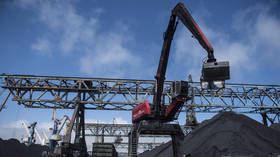China turns away Australian wine amid escalating trade row
Thousands of bottles of wine from two Australian producers were stopped at Chinese ports last month as Beijing continues to restrict billions of dollars of Australian exports amid simmering row between the two nations.
Several batches totaling around 20,000 liters from Australian winery Badger’s Brook Estate, as well as 3,000 liters of wine from Penfold, part of Treasury Wine Estate, were detained in ports in Shenzhen and Chongqing in January, according to recent Chinese customs data. Chinese customs said that both shipments were stopped at the ports due to labeling issues, without giving further details.
Also on rt.com Beijing accuses Australia of politicizing business as Chinese bid for major builder is blocked for 'security concerns'Australia’s billion-dollar wine industry has been one of the targets of the trade war between Beijing and Canberra. Last year, China imposed sweeping tariffs ranging from over 100 percent to more than 200 percent on Australian wine imports in response to alleged price-dumping.
Punitive duties hit Australian winemakers hard, as China was once their biggest importer, accounting for nearly 40 percent of Australia’s wine exports. For one of the biggest listed winemakers in the world, Treasury Wine Australia, China used to account for around a third of the company’s profit. The winemaker suffered a 43 percent slump in first-half net profit, it revealed earlier this month, adding that it might be forced to sell some of its assets to cut costs.
Wine is not the only product caught up in the trade conflict. Goods such as barley, coal, and beef have also faced difficulties entering the Chinese market.
Tensions between the two countries have been growing since 2017, after the Australian government introduced foreign interference laws considered to be aimed at China. Relations further deteriorated when Australia became the first country to ban China’s Huawei from its 5G network in 2018. Canberra also drew Beijing’s ire last year when it called for an international inquiry into the origins of the coronavirus outbreak.
While the two nations have recently become members of Asia’s biggest trade pact, the Regional Comprehensive Economic Partnership (RCEP), the deal has not resolved existing trade issues between them. The Chinese government insists that Australia “adopted restrictive or even discriminatory measures which have ruined the co-operative atmosphere between us,” Vice Commerce Minister Wang Shouwen said on Wednesday. He added that Australia could do more to restore trust and cooperation.
For more stories on economy & finance visit RT's business section















